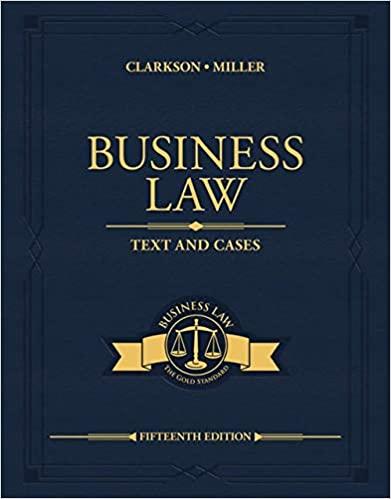Question
Kelsey and Kathryn became friends when they were studying to be paralegals. Kathryn now works for a large national law firm, while Kelsey does freelance
Kelsey and Kathryn became friends when they were studying to be paralegals. Kathryn now works for a large national law firm, while Kelsey does freelance paralegal work. Over the years, they have met frequently to discuss office issues and client cases. Today, Kelsey asked Kathryn to meet for lunch at a crowded sandwich shop in the office building where she works to discuss a recent matter. Kathryn could see that something was troubling her friend. After getting a seat at the counter, they ordered lunch, and Kelsey began to confide in Kathryn. Kelsey regularly does freelance work for two suburban sole practitionersone who specializes in intellectual property issues and occasionally does plaintiffs' injury work for friends and family, and one who does mostly personal injury work. Both are working on the same case, and both have asked Kelsey to work on the file. One lawyer represents the plaintiff, a close family friend, and the other lawyer represents the defendant. Both lawyers want Kelsey to interview the clients and witnesses and generally handle the file. Kelsey is wondering whether she should be working "both sides of the fence." Kelsey describes to Kathryn the clients and the case in detail while they wait for their lunch to be served. Kelsey also explains that she often does most of the work on the plaintiff lawyer's cases not related to intellectual property, including settling the cases with insurance company adjusters or the lawyers representing the defendants. Kelsey knows the adjuster on this case, and he has revealed to her that the insurance company for the defendant wants to settle the case quickly and avoid a trial. Kelsey asks Kathryn for advice.
1. Imagine that a local lawyer who knows both Kathryn and Kelsey is sitting next to them and overhears their conversation. The lawyer then sends a letter to the local Ethics Board. Have one group represent the Ethics Board, one group represent Kathryn's employer, and another group represent Kelsey's employers. 2. How should the Ethics Board respond? 3. How should the lawyers Kelsey works for respond? 4. Summarize the advice the group would give to Kathryn and Kelsey and to the law firms that employ them
Step by Step Solution
There are 3 Steps involved in it
Step: 1

Get Instant Access to Expert-Tailored Solutions
See step-by-step solutions with expert insights and AI powered tools for academic success
Step: 2

Step: 3

Ace Your Homework with AI
Get the answers you need in no time with our AI-driven, step-by-step assistance
Get Started


